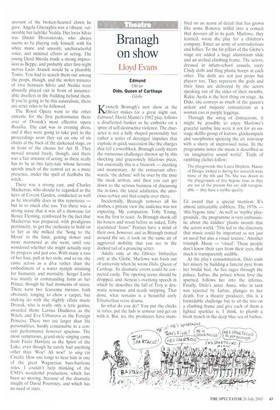Branagh on show
Lloyd Evans
Edmund Olivier Dido, Queen of Carthage Globe
Trenneth Branagh's new show at the IX.Olivier makes for a great night out. Edmund, David Mamet's 1982 play, follows a disaffected banker as he embarks on a spree of self-destructive violence. The character is not a fully shaped personality but rather a series of deranged impulses that explode in quick succession like the charges that fell a towerblock. Branagh easily meets the numerous challenges thrown up by this shocking and gruesomely hilarious piece, but essentially this is a firework — dazzling and momentary. At the restaurant afterwards, 'the debate' will be over by the time the steak arrives, and then you can get down to the serious business of discussing the in-laws, the latest adulteries, the atrocious service and that couple over there.
Incidentally, Branagh removes all his clothes, a private view the audience was not expecting. My companion, Toby Young, was the first to react. As Branagh shook off his boxers and stood before us naked, Toby ejaculated 'Jesus!' Penises have a mind of their own, however, and as Branagh trotted around the set, it took on the same air of aggrieved mobility that you see in the docked tail of a prancing setter.
Adults only at the Olivier. Imbeciles only at the Globe. Marlowe was fresh out of university when he wrote Dido, Queen of Carthage. Its dramatic errors could be corrected easily. The opening scene should be dropped, and Aeneas's overlong speech in which he describes the fall of Troy is dramatic nonsense and needs snipping. That done, what remains is a beautiful early Elizabethan verse drama.
So what do you do? You put the chicks in robes, put the lads in armour and get on with it. But, no, the producers have stum
bled on an acorn of detail that has grown like some B-movie triffid into a conceit that devours all in its path. Marlowe, they learned, wrote the play for a children's company. Enter an army of contradictions and follies. To the fat pillars of the Globe's stage are added a huge aluminium slide and an arched climbing frame. The actors, dressed in infant-school casuals, carry Cindy dolls and fling plastic hoops at each other. The dolls are not just props but players too. They represent the gods and their lines are delivered by the actors speaking out of the sides of their mouths. Rakie Ayola is the best thing on stage. As Dido, she conveys as much of the queen's ardent and majestic romanticism as a woman can in purple leggings.
Through the smog of distractions, it might be possible to enjoy Marlowe's graceful iambic line were it not for an onstage skiffle-group of kazoos, glockenspiels and saxophones spraying the air non-stop with a slurry of improvised noise. In the programme notes the music is described as 'an imaginative sound world'. Trails of rambling clichés follow:
The playgrounds that Laura Hopkins, Master of Desien, looked at during her research were those of the 60s and 70s. She was drawn to the playgrounds of this bygone time as they are not of the present but are still recognisable — they have a mythic quality.
I'd award that a special mention. It's almost unbeatable cobblers. The 1970s — 'this bygone time'. As well as 'mythic playgrounds', the programme is very enthusiastic about the kiddies' plastic swords that the actors wield. 'This led to the discovery that music could be important as not just an aural but also a visual texture.' Another triumph. Music — 'visual'. These people don't know their ears from their eyes, that much is transparently audible.
At the play's consummation, Dido ends her misery by building a funeral pyre from her bridal bed. As fire rages through the palace, Iarbas, the prince whose love she spurned, follows her into the inferno. Finally, Dido's sister Anna, who in turn was rejected by Iarbas, plunges to her death. For a theatre producer, this is a formidable challenge but to sit the trio on a climbing frame and give each of them a lighted sparkler is, I think, to plumb a fresh trench in the deep blue sea of bathos.


























































 Previous page
Previous page